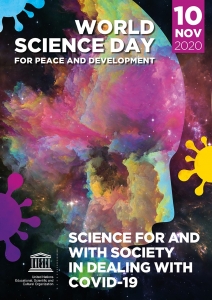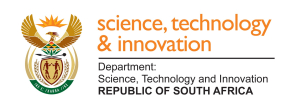Celebrating the World Day of Science 2020
The National Research Foundation (NRF) of South Africa joins with organisations from across the globe in celebrating the World Day of Science. This year, at a time when the world is challenged by the global Covid-19 pandemic, the focus of World Science Day is on “Science for and with society in dealing with the global pandemic.” Celebrated each year on 10 November, World Science Day for Peace and Development highlights the significant role of science in society and the need to engage the wider public in debates on emerging scientific issues. It also underlines the importance and relevance of science in our daily lives.
COVID-19 Research Funding
In pursuit of science with and for society, the NRF recently worked together with partners, under the auspices of the Science Granting Councils Initiative in sub-Saharan Africa, to support the fight against the Covid-19 pandemic in Africa through a coordinated and responsive research effort and effective, evidence-based communication and science engagement. The Covid-19 Africa Rapid Grant Fund, to the value of $4.74 million (USD), is supporting three streams. These are: research into Covid-19, prevention and control, socio-cultural dynamics of transmission, health governance systems and other relevant areas; science and health journalism to support efforts to produce and disseminate factual information and facilitate engagement between scientists and publics; and science advice to support rapid and relevant engagement with decision-makers for effective regional and continental responses.
Additionally, the NRF works multi-laterally in the context of the Global Research Council (GRC), a virtual organisation that has been enabling sharing of experiences and funding agency practices to support science’s response to Covid-19, including the equality, diversity and inclusion dimension of the pandemic. Together with Cote d’Ivoire’s PASRES, the NRF will be convening its equivalent organisations in sub-Saharan Africa to share learnings and practices in responding to Covid-19 on 30 November 2020 as part of a series of GRC Covid-19 seminars held across all the five GRC regions.
Astronomy and COVID-19
South Africa has been part of a multidisciplinary and collaborative global response to Covid-19 by researchers and research organisations. An example of this is the International Astronomical Union Office of Astronomy for Development (IAU OAD), which was established in partnership with the NRF, who are not only focused on the stars but also on global challenges. The link between studying the stars and fighting a deadly pandemic may not be obvious, but astronomy and related fields possess strengths that can be applied to solving everyday challenges and benefitting communities. The IAU OAD, together with partners, has responded to this challenge by funding small projects across the globe to support communities in overcoming some of the effects of Covid-19.
COVID-19 Monitoring
In South Africa, we have seen local, interdisciplinary teams come together to respond to the pandemic, even drawing on mathematical modelling capabilities of nuclear scientists. Scientists from Wits University and NRF-iThemba LABS, in collaboration with the data analytics team of DataConvergence, have developed a monitoring tool for coronavirus in South Africa (www.covid19sa.org). The mathematical models use data, in conjunction with global inputs and local parameters, to provide predictions for the spread and impact of the coronavirus in the country.
South African Research Chairs Initiative
As the NRF celebrates the World Day of Science, we are cognisant and grateful for the dedication and commitment of the NRF-funded researchers who seek to deepen the relationship between science and society in South Africa. As an example, within the South African Research Chairs Initiative (SARChI), this commitment has been seen through a diverse and wide range of initiatives including:
- The creation of a bilingual isiXhosa-English intermediary science lexicon for schools;
- The involvement of citizens in monitoring Cape Parrot populations in South Africa;
- The assessment of the conservation status of a large number of exploited fish and shellfish species, as background for a major consumer awareness programme (SASSI-SA Sustainable Seafood Initiative) run by WWF;
- The provision of the SA wine industry with up-to-date research information;
- The development of a children’s book about sustainable malaria control in Africa; and
- Public bat walks in the botanical gardens to explore bat biology, ecology, conservation and enhance awareness of bat-borne viruses.
To improve and deepen the relationship between science and society, the NRF has laid out five key areas of delivery in its recently adopted Vision 2030. It is a priority for the NRF to strengthen high-quality engagement as an integral part of research, embedding an approach of engaged research. Meaningful and impactful engagement between researchers, the media, science communicators, industry and other stakeholders requires focus on building science engagement capacity and capability. Focusing on industry, the NRF recognises the private sector as important to promoting a more effective interface between science and society and thus facilitating partnerships, and strengthening and developing collaborations with the private sectors is one the key focus areas. Research and science engagement infrastructure should be made more accessible to the public so that investment in these infrastructures brings maximum benefit to society. The NRF is committed to supporting the development of science, technology, engineering, mathematics, and innovation education to improve participation and performance, and develop human capacity, in these critical areas. These key areas form an integrated approach to leading, supporting and enriching science for and with society.


 The South Africa Agency for Science and Technology Advancement (SAASTA) is a business unit of the
The South Africa Agency for Science and Technology Advancement (SAASTA) is a business unit of the 
